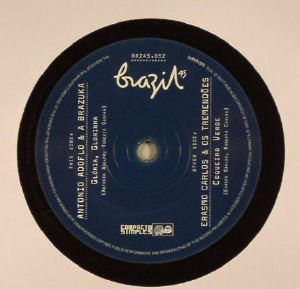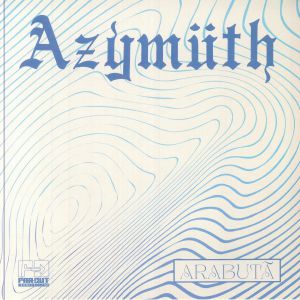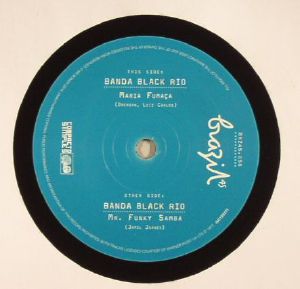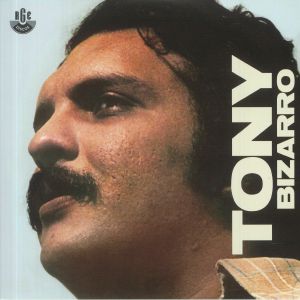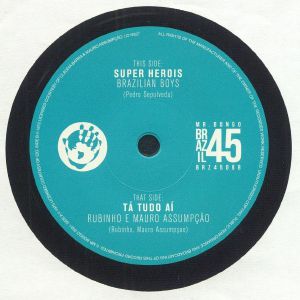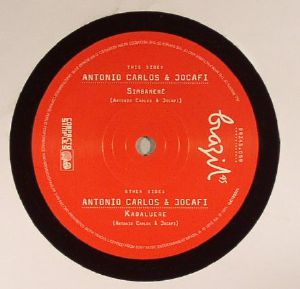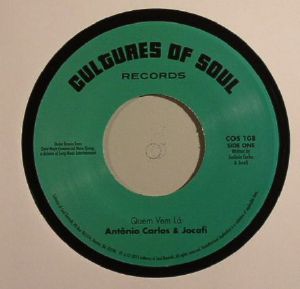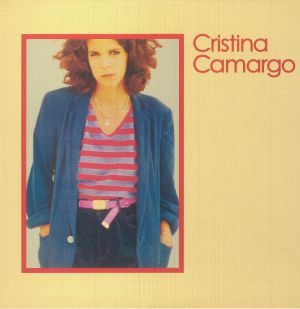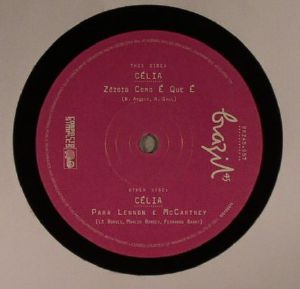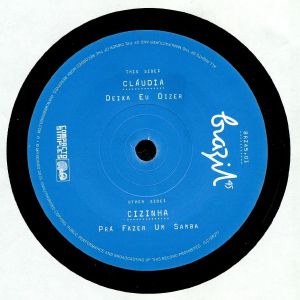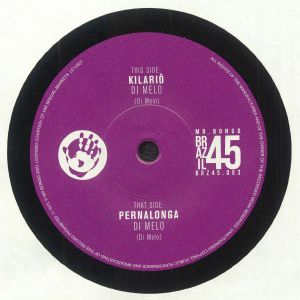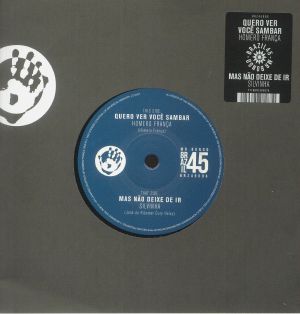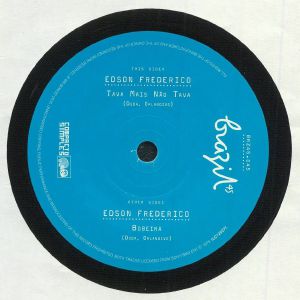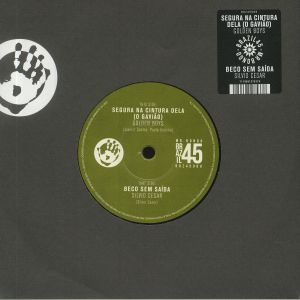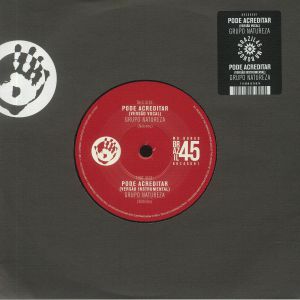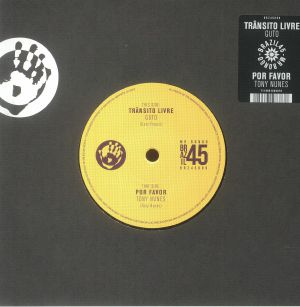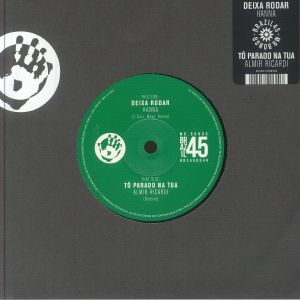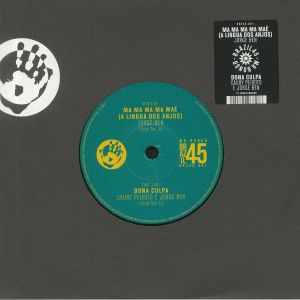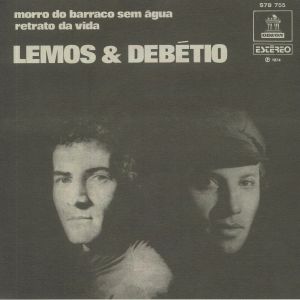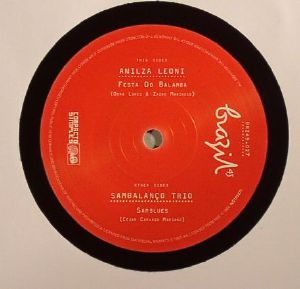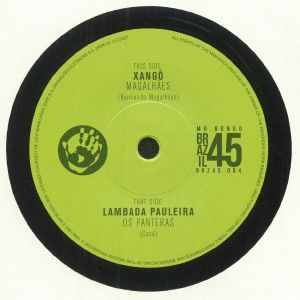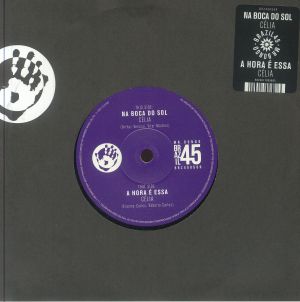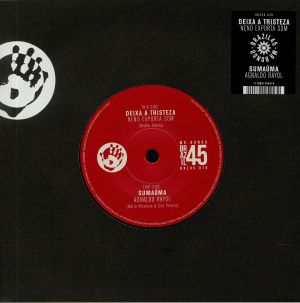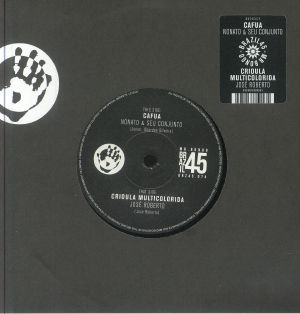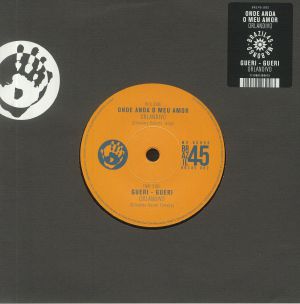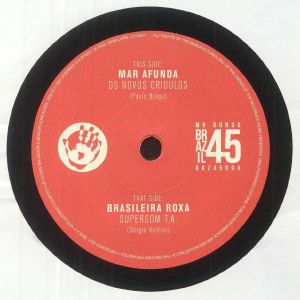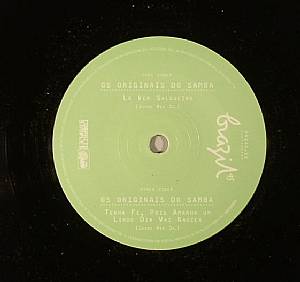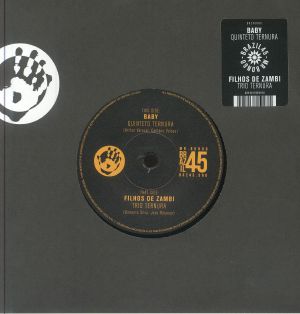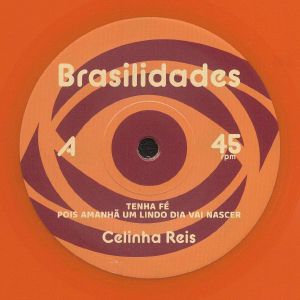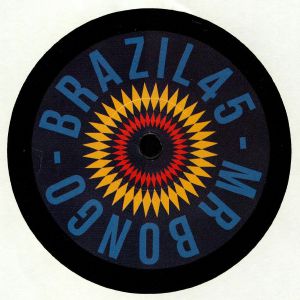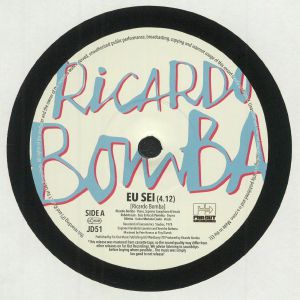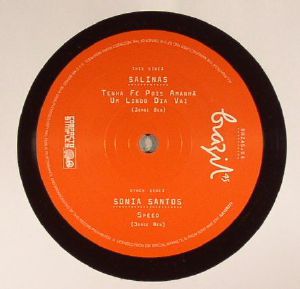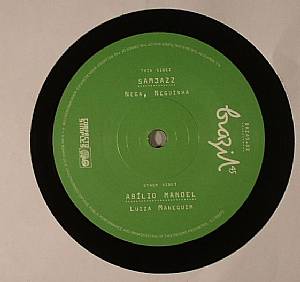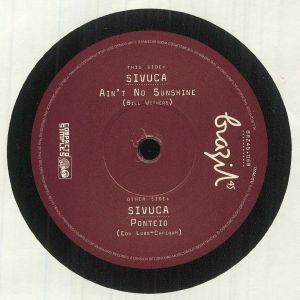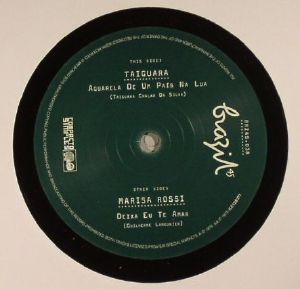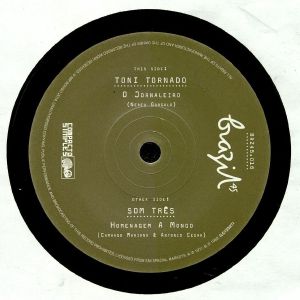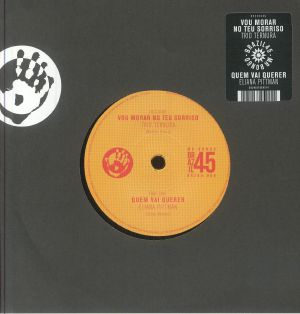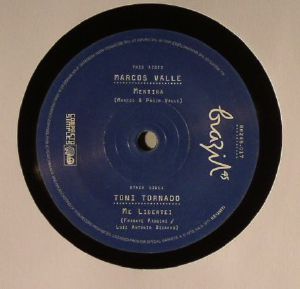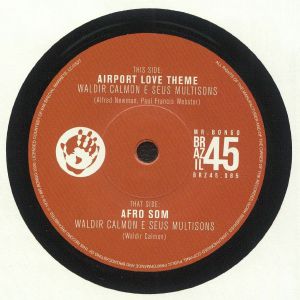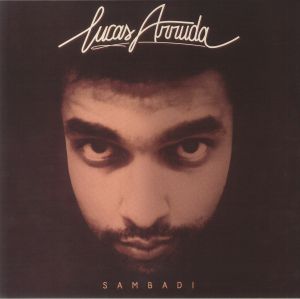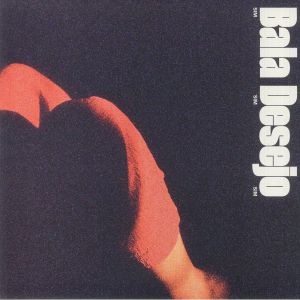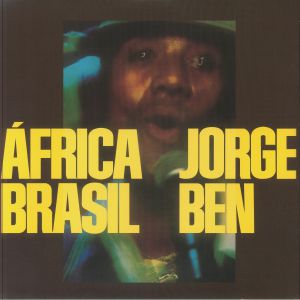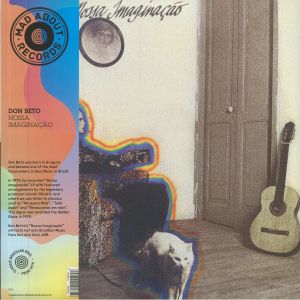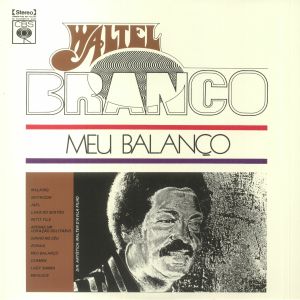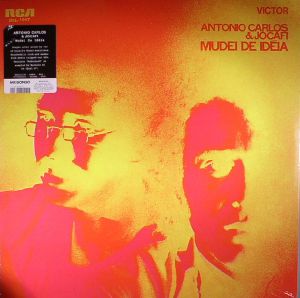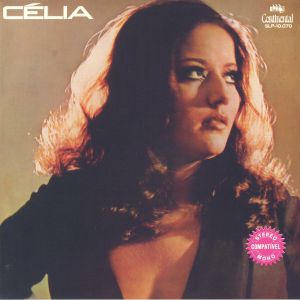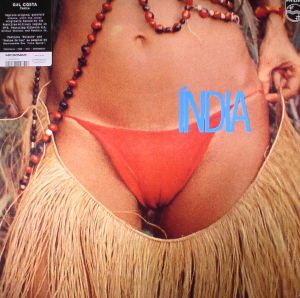Filter
在庫状況
Featured
リリースタイトル
値段
Back catalogue: Funk
Juno's full catalogue of Funk
シングル
in stock $12.58
Review: Legendary Brazilian jazz-funk trio Azymuth drop their latest record 'Arabuta', pointing themselves in a new cardinal direction in sound. The limited 7" brings two new mix version of their recently released 'Arabuta' to the fold, both by fellow producer and Azymuth collaborator Daniel Maunick. Part-dancefloor, part-dub, both versions bring preservative tones, fully circling the resinous Brazilwood tree after which the track is named. The Tupi Guarani word for the endangered tree fuses with deft unperturbed jazz licks, despite the sense of urgency in saving the species, underscoring Azymuth's fusion of timeless Brazilian jazz-funk and cosmic futurism. In more ways than one, this record serves as a symbol of both the value and fragility of Brazil's natural beauty.
… Read more in stock $19.56
Review: For the latest release on their on-point Brasil 45s sub-label, Mr Bongo takes a trip back to 1977, and the early days of legendary fusion outfit Banda Black Rio. Both the cuts here are taken from the band's brilliant debut album, Maria Fumaca, and see them fusing Brasilian samba and jazz sounds with the righteous, dancefloor-friendly grooves of funk and disco. "Maria Fumaca" itself is a deliciously sunny and sweaty affair, with punchy horns, eyes-closed guitar solos and jazz-funk electic piano lines rising above a carnival-ready samba-funk groove. The U.S funk influence comes to the fore more on flipside "Mr Funky Samba", which sounds like Azymuth jamming with members of the T.K Disco, Philadelphia International and Salsoul house bands. Yep, it's that good.
… Read more in stock $8.84
Review: Brazilian electronics are back in vogue, and Tony Bizzaro might have just snaffled up said new wave's crown. All the way from 1976 comes 'Que Se Faz Da Vida', a strutting, suave, emotionally cool EP of only the most DJ-able and collected soul-funk. This reissue is, bizarrely, Bizarro's first ever.
… Read more in stock $10.05
Review: We'll never tire of the incredible Brazil45 series on Mr Bongo, which has provided an authoritative window into the rich history of 60s and 70s grooves from South America. Here's a missing joint from the series which took some time to come to fruition - a split release featuring Brazilian Boys on the A side and Rubinho E Mauro Assumpcao on the B. 'Super Herois' is an obscure slice of off-kilter, psych tinged funk from 1975 that has the kind of individual sound which could find favour with a lot of different DJs. 'Tudo Ai' has a more recognisable samba shuffle, but much like the A side there's a subtle twist in the sound which leans towards blues rock and jazz, locking down on the rhythm and creating a low-key party starter in its own unique way.
… Read morePlayed by: Juno Recommends International
in stock $11.17
in stock $12.29
Quem Vem La (7")
Cat: COS 1087. Rel: 11 Jan 16
in stock $9.78
Cat: MESS 001RE. Rel: 04 Jul 23
Review: Hot on the heels of this one first being reissued back in May, it now gets a second run courtesy of Disques Messager out of France. Cristina Camargo's 'Moral Tem Hora' was one of the standouts from the super Brazilian Disco Boogie Sounds (1978 - 1982: selected by Junior Santos) compilation. It's a perfect fusion of Latin flair, Brazilian disco and jazz funk magic that has fat bass riffs and lots of bright chords and busy percussion next to a classic vocal. On the flip things get slower, sentimental and all loved up on 'Minas Do Rei Salomao' which his a perfectly steamy jam for those hot afternoons under the sun.
… Read more in stock $17.05
Review: Mr Bongo take an MPB breather, tempering their recent larger-scale ambition to reissue mammoth Brazilian disco on comp with a 7" side order appetiser of a classic Brazilian MPB track. Celia's 'Na Boco Do Sol' ('At the Mouth of the Sun') is a gestalt slice of slow-samba, bringing with it a dash of torrid soul and telenovela cinematics. The favourite Arthur Verocai collaborator sings of psychic cities and imaginariums of the soul, verifying a well-travelled spirit; Verocai himself, and Vitor Martins, both lend the song a fuzzy phonic with their guitars and strings. And on the B side comes 'A Hora e Essa, the first track from her second self-titled LP: a lively samba-funk workout, doused in jazzy piano licks, strutting guitars and punchy horns.
… Read more in stock $12.58
Played by: JimmyTheTwin, Far Out Recordings
in stock $10.62
Review: 'Deixa Eu Dizer' is a timeless Brazilian classic that was famously sampled by Marcelo D2 on his iconic hip-hop track 'Desafabo' and maybe just as notary, it was also the debut release on Mr Bongo's now much loved Brazil 45's imprint. It originally featured on Cizinha's stunning album of the same name and until Mr Bongo stepped in it had never been available on a 7". 'Deixa Eu Dizer' has been a long-standing favourite with deep diggers despite its mysterious origins and this welcome reissue not only celebrates Cizinha's unforgettable contribution to Brazilian music but also brings this beloved track to a new generation.
… Read morePlayed by: Juno Recommends International
in stock $10.62
in stock $12.58
Black Soul Brothers (7")
Cat: BRZ45 05. Rel: 25 Apr 14
in stock $12.58
Review: For the 83rd release in their Brazil 45 series, Mr. Bongo presents yet another a gem in the form of two classic tracks by Brazilian soul legend Roberto De Melo Santos, also known as Di Melo. Born in Recife in 1949, Di Melo is celebrated as an icon of Brazilian funk despite a limited discography. His 1975 self-titled debut is a prized collector's item that is widely loved by Brazilian funk fans, breakbeat enthusiasts and sample seekers. This release revives two standouts from that cult album in 'Kilario,' which is a smooth, soulful masterpiece, and 'Pernalonga,' a feel-good tune featuring catchy guitar, horns and a memorable drum break that was famously sampled in 2009's 'The People Tree.'
… Read morePlayed by: Juno Recommends International
in stock $10.62
Review: Mr Bongo's gold-standard Brazil-45 series turns up more irresistible musical goodness here with steamy underground bubbler 'Quero Ver Voce Sambar'. This is thought to be the only ever recording by Homero Franca and it came originally on a 7" in 1976. It's warm, soulful, quite deep for Latin music and has great vocals. On the flipside is the more fiery Silvinha tune 'Mas Nao Deixe De Ir' with the raw vocals and big horns all making for a great call and response chorus with soulful samba sounds to spare.
… Read more in stock $12.58
in stock $12.58
Cat: BRZ 45089. Rel: 20 Jul 21
Review: Mr Bongo's essential Brazil 45s series notches up release number 89 via a blast of heavy dancefloor pressure that touches on both Brazilian funk and samba-rock. On the A-side you'll find Golden Boys' 1975 gem 'Segura Na Cintura Dela (O Gaviao)', an irresistible slab of full-throttle, orchestra-sporting, Hammond-heavy samba-funk marked out by strong group vocals and some superb musical arrangements. Over on the flip you'll find another classic from the same producer (Milton Miranda), Silvio Cesar's 1971 carnival masterpiece 'Beco Sem Saida' - an infectious excursion that found fame in the 2000s when Drumagick sampled it on 'Sambarock'.
… Read morePlayed by: Fabietto Delgado (Ankle Release)
in stock $12.58
Played by: I Love Disco!, Juno Recommends International
in stock $12.58
Review: Mr Bongo's authoritative Brazilian 7" series continues apace with this delightful gem, featuring the magical talents of Guto on the A-side and Tony Nunes on the flip. Guto's 'Transito Livre' is a sweet slice of MPB (musica popular brasileira) which switches time signatures with flair from verse to chorus. Tony Nunes turns the heat up with 'Por Favor', a 1973 cut which sounds like it could jump right off the turntable with its fiery, funky urgency. Another essential purchase for all those who love hidden nuggets from Brazil's abundant musical history.
… Read morePlayed by: Voodoocuts
in stock $12.58
Review: Mr Bongo are enacting a thorough revisiting of some of the very best soul, funk, MPB and boogie gems to stud their catalogue over the years; at this rate, the tagline "back by popular demand" has become a motto. This careful pairing of mutually constitutive Hanna and Almir Ricardi tunes made up the label's 54th release. 'Daixa Radar' comes first as the initial "rediscovery" of DJ Koco, whose Brazil 45's mix was the functional tipoff. Ricardi's 'To Parado Na Tua' is a similar midtempo boogie cut, produced by the legendary duo of Lincoln Olivetti and Robson Jorge, whose singularly timbral slap-drums are to die for.
… Read more in stock $12.58
Cat: BRZ 45081. Rel: 16 Oct 20
Review: Mr Bongo's excellent Brazil.45 series digs deeper into the legacy of Jorge Ben, one of Brazil's most famous musical exports and an enduring samba king. Opening up is 'Ma Ma Ma Ma Mae (A Lingua Dos Anjos)' which was originally on his 1980 album Alo Alo, Como Vai? It's a modern sound, with disco inflections and big wind sections, but also some trademark Ben playfulness in the lyrics which speak of flying saucers and angels. O the flip, things slow down and get more steamy and sensuous on 'Dona Culpa' from his Cauby! Cauby!' album of the same year. Two sides, two styles, one irrepressible artist.
… Read more in stock $12.58
Morro Do Barraco Sem Agua (reissue) (limited green vinyl 7")
Cat: MRB 7181G. Rel: 09 Apr 21
Played by: JKriv (Razor-N-Tape), Juno Recommends International
in stock $17.88
Festa Do Balamba (limited 7")
Cat: BRZ 45 027. Rel: 19 Aug 15
in stock $12.29
Review: The charming 'Xango' by Magalhaes from his 1986 album E Sua Guitarra on Gravasom Records is an electrifying Lambada track with haunting vocals and infectious energy that now gets reissued as part of the superb series from Mr Bongo. It is a guaranteed dancefloor rescuer for DJs worldwide and has in fact been building momentum in recent years. It remains a favourite for its driving rhythm and captivating intensity and on the B-side is 'Lambada Pauleira' by Os Panteras, which was released in 1987 on Gravasom. Known for Joutro Mundo's popular re-edit, this original version stands out with its quirky charm and undeniable appeal and is a staple for renowned Brazilian DJs, including Augusto Olivani (aka Trepanado).
… Read more in stock $9.23
Review: The wonderful Brazil 45 series from Mr Bongo is back with its big old torch to shine a beam of deserving attention on two standout funk and bossa nova tracks from Rosa Maria, which originally came in 1972 and have remained in demand ever since. The A-side, 'Deixa Nao Deixa', blends Afro-Latin guitar, wild horns and percussion with infectious vocal harmonies that all coalesce into a Brazilian funk classic. On the B-side, 'Avenida Atlantica' delivers alternating funk and bossa beats beneath layers of vocals, horns and percussion to bring big energy and dancefloor-ready heat. This reissue ensures these timeless tracks become available for your rotation once more.
… Read morePlayed by: ISOUL8 (Volcov)
in stock $12.58
Deixa A Tristeza (7")
Cat: BRZ45 076. Rel: 07 Feb 20
Review: After delivering some killer reissues over the last few years, Mr Bongo's brilliant Brazil 45s series has reached "buy on sight" status. It goes without saying that the label's latest double-header of hard-to-find Brazilian gems is white hot. A-side Neno Exporta Som's impossible-to-find 1971 gem "Deixa A Tristeza", a wild and life-affirming fusion of samba and funk full of fuzzy sax solos, glassy-eyed vocals and heavyweight grooves. Over on the flip you'll find another killer cut from '71: "Sumauma" by MPB star Agnaldo Rayol. Blessed with a great groove and incredible arrangement, it sounds like a Brazilian take on the sort of over-the-top songs used to open James Bond movies in the 1970s (albeit with a bit of samba sunshine thrown in).
… Read more in stock $10.91
Cafua (remastered) (7")
Cat: BRZ 45074R. Rel: 27 Sep 24
Review: Mr. Bongo credit themselves with taking a selection of the most in-demand and asked-for titles in their Brazil '45s catalogue, lending them all a loving repress in due homage to the music of the nation. This time, they focus their energies on the synergy shared between the late composer and record producer Nonato Buzar and drummer Jose Roberto, both of whose contributions to the MPB canon are unmissable, referent sonic studs. Nonato's 'Cafua' is a powerful eurythmic, its strigiform vocals proving a suitable narcotic to offset to the track's otherwise restless horns and post-bossa-nova drum clacks, which hit like quick patterings against soft cartilage. Roberto's 'Crioula Multicolorida' is a more vintage recording, erstwhile bringing rare "samba rock" grooviness and reflective, call and response lyricisms to a redolent rhythm.
… Read morePlayed by: Juno Recommends Funky House, Juno Recommends Funk
in stock $10.91
Review: Following persistent requests, Mr Bongo has finally relented and dedicated an edition of their popular Brazil 45s series to Orlandivo Honorio de Souza, a composer, singer and percussionist whose 1977 album Oelandivo remains high on my collectors' wants-lists. Wisely, their A-side pick is 'Onde Anda O Meu Amore', a cosmic and spacey fusion of samba-soul and jazz-funk rich in ethereal flute lines and intergalactic keys. This time round it comes backed by the equally as impressive 'Gueri Gueri', an insatiable samba-rock number wrapped in heady accordion, jangly acoustic guitar and punchy horn sounds.
… Read morePlayed by: Voodoocuts, Afro Beat Foundation
in stock $12.58
Review: Mr Bongo's Brazil45 series continues apace with this 95th entry, which carries two separate sides to keep any Latin-minded DJ very happy indeed. 'Mar Afunda' is a dancefloor delight from Os Novos Crioulos which originally came out on the group's self-titled album on Pirata in 1976. It's shuffling and sublime, sure to get a plethora of ID requests and shimmying moves from the people with their ears tuned in. On the flip we get Supersom TA's 'Brasileira Roxa', a sunny slice of samba fun which originally came out in 1972 and features more cuica flexing than you could ever dream of.
… Read more in stock $12.58
Review: Samba flavours do not come more authentic than this. The sixth in Mr Bongo's Brazil 45 series, here they unearth two foundation pieces from Rio collective Os Origianais Do Samba. Forming in 60s Rio, they're still highly active today and have a discography peppered with Brazilian gold. This 45 does well to showcase their breadth... "La Vem Salgueiro" is quintessential samba. Heavy rhythm, punctuated vocals and a dynamic that leaps from bold and delicate in a flash, it charms you instantly. "Tenha Fe" has a softer soul as it strums and sways and more of a folky sensation, tight harmonies and alluring naked instrumentation.
… Read more in stock $12.58
Baby (remastered) (7")
Cat: BRZ 45060R. Rel: 27 Sep 24
Review: The remastered 7" reissue from Brazil 45s/Mr Bongo features two highly coveted tracks from Quinteto Ternura and their predecessor, Trio Ternura. This pressing revives two rare gems from the past with a fresh, high-quality cut. On Side-1, Quinteto Ternura delivers 'Baby,' a dazzling Brazilian modern soul track penned by Caetano Veloso and arranged by Arthur Verocai. Originally from their 1974 self-titled LP, this song is a smooth blend of tropical bliss and has long been a cherished rarity. Flipping to the Side-2, Trio Ternura's 'Filhos De Zambi' offers an upbeat samba-funk delight. Released in the same year, this track is filled with vibrant energy from the original trio, featuring a catchy chorus and a dynamic key change. Co-written by the siblings' father Umberto Silva and Jose Ribamar, it remains a dancefloor favorite. This reissue provides a valuable opportunity to own these classic tracks in their prime.
… Read morePlayed by: Juno Recommends Funk
in stock $10.05
Tenha Fe Pois Amanha Um Lindo Dia Vai Nascer (limited orange vinyl 7")
Cat: B 1. Rel: 13 Nov 24
Played by: Juno Recommends International
in stock $18.73
Review: For the latest volume in their essential "Brazil 45" series of seven-inch singles, Brighton-based Mr Bongo has decided to offer up a fresh pressing of MPB star Renata Lu's superb 1971 single "Faz Tanto Tempo". You'll find the title track, a heavyweight fusion of US style soul and funk with added Latin percussion and a touch of easy listening sassiness, on side A, with original B-side "Sambaloo" on the flip. This features Lu singing over a hybrid samba/boogaloo backing track rich in jaunty bass, rasping horns and jazzy electric piano riffs. It's arguably every bit as alluring as the A-side.
… Read morePlayed by: Mukatsuku Records Chart, Ju & juju
in stock $11.17
Review: Ricardo Bomba was not only a studio owner, engineer, pianist and composer, but so too was he an accomplished amateur skateboarder. He lay down these previously unreleased, sun soaked Brazilian tunes in 1978 after years as bandleader with the one and only Jorge Ben's live show. The master tapes were said to have been binned during a heavy studio clear out but the man himself kept a tape copy that has been remastered for this special 7". Mariana Couto provides the angelic vocals while the music all trills with joy and happiness.
… Read morePlayed by: Juno Recommends Funk, Red Greg
in stock $13.13
Cat: BRZ 4504. Rel: 27 Mar 14
in stock $11.17
in stock $12.58
Review: Amongst fans of Brazilian music, Sivuca is arguably best known for his 1973 cover of "Ain't No Sunshine" - later a favourite on the rare groove scene - which re-casts the Bill Withers classic as a sumptuous chunk of shuffling samba sunshine. Here, the track gets reissued as part of Mr Bongo's brilliant Brazil 45s series, alongside his lesser-known - but no less impressive - cover of Edu Lobo's "Ponteio".
… Read more in stock $12.58
Aquarela De Um Pais Na Lua (limited 7")
Cat: BRZ 45038. Rel: 25 Jan 16
Review: Mr Bongo's Brazil 45s series continues its consistently rich vein of form with two more beautifully contrasting - and previously difficult to track down - Brazilian soul jazz fusions from the 70s. Side A is inhabited by one of the era's most interesting individuals. Infamously censored and eventually exiled, Taiguara's chaotic flute, guitar and piano arrangement is a tight weave of melodies, counter melodies and start dynamics. Flip for the classically soul-oriented "Deixa Eu Te Amar" will bright horns, brash drums and a bold vocal from Marisa Rossi. Pow.
… Read morePlayed by: Afro Beat Foundation, The Expansions
in stock $12.58
Review: Rich gutsy soul from a man who's regularly described as Brazil's James Brown, "O Journalerio" is a blueprint funk jam. Released in 1971 (on his hyper-rare album BR-3) it's all about the orchestrated swing, bluesy groove and Hammond licks so lavish you need to towel on every listen. Flip for Som Tres... An off-shoot of the Sambalanco Trio, it's the sound of Cesar Camargo Mariano controlling a restrained rolling slice of filmic instrumental funk where horns, keys and drums gather momentum with big band drama. Neither have been released on 45" before, making this all the more special.
… Read more in stock $12.29
Cat: BRZ 45069R. Rel: 27 Sep 24
Review: The relaunch of the BRZ45s series brings back some of the most coveted Brazilian 45s, this time with a vibrant new design. This release features two standout tracks sure to captivate collectors and DJs alike. On Side-1, Trio Ternura's 'Vou Morar No Teu Sorriso' delivers an energetic blend of funk and soul, with powerful drums, dynamic breaks, and rich horns that drive the track forward. Originally from their 1971 self-titled LP, it's a perennial favorite in DJ sets, known for its infectious rhythm and big, soulful vocals. On Side-2, Eliana Pittman's 'Quem Vai Querer', a samba-funk gem from 1977. This track rolls out with a groovy samba beat, layered percussion and Eliana's captivating lead vocal, building beautifully into a catchy chorus, with the intensity of the drums amplifying as it progresses. Both tracks are perfect for the dancefloor, offering a taste of Brazil's rich musical heritage with a fresh, modern twist.
… Read morePlayed by: Juno Recommends International
in stock $10.91
Review: Two premium Latin funk documents on one limited 45, Mr Bongo deliver once again: Marcos Valle needs no introduction to Brazilian music enthusiasts. "Mentira" is a self-cover as Valle takes his 69 classic "Mentira Carioca" and develops the dynamic with a vocal style that's highly reminiscent of Donovan. Flip for Toni Tornado's Black Rio anthem "Me Libertei". Fusing sleazy rock n roll with jazzy Latin soul, madly this is the first time it's ever graced a 45!
… Read more in stock $12.58
Cat: BRZ45 085NB. Rel: 01 Nov 24
Review: Waldir Calmon's 'Airport Love Theme' has that special appeal that makes it a true gem. Sampled by Madlib on the Madvillain album track 'Curls', this lounge classic from Calmon's 1970 Waldir Calmon E Seus Multisons LP on Copacabana exudes nostalgic charm. Despite its unassuming cover, 'Airport Love Theme' delivers a dreamy, feel-good vibe that could soundtrack a perfect world. Afro Son, from the same album, shifts towards a Brazilian-rooted, cinematic groove, reminiscent of Jean Jacques Perrey's E.V.A.. Calmon, a Brazilian music fixture from the 50s to the 80s, who collaborated with legends like Tom Jobim and Joao Gilberto and left a unique musical legacy that lives on in these timeless tracks.
… Read morePlayed by: Juno Recommends International
in stock $10.91
アルバム
in stock $25.43
Review: It's no mean feat to win awards with your debut album, but Bala Desejo did just that when they scored big at the Latin Grammys. As soon as you hit play on Sim Sim Sim you'll understand why, as the Rio de Janeiro band demonstrate their canny blend of 60s tropicalia, 70s psychedelia and MPB. It's pure pleasure music, full of wistful escapism and aching beauty, and in drawing so naturally on the best of Brazilian music culture through the ages, they've made something truly woven into the fabric of their home country. Spearheading a new wave of music and art from Rio de Janeiro, Bala Desejo have everything you could possibly want from a new Brazilian project, and more besides.
… Read morePlayed by: Charlie bucket/ dancing in space
in stock $24.04
Africa Brasil (reissue) (limited 180 gram "beer" translucent brown vinyl LP)
Cat: FS 4485. Rel: 19 Jul 24
Played by: Juno Recommends International
in stock $20.69
Review: Don Beto was born in Uruguay and became one of the most forerunners of Soul Music in Brazil in 1979, he recorded "Nossa Imaginacao" LP wich featured arrangements by the legendary producer Lincoln Olivetti, and where we can listen to classics such as "No quero Mais", "Tudo again" and "Renascendo em mim". This album was awarded the Golden Globe in 1979.
Don Betto's "Nossa Imaginacao" attracts not only Brazilian Music Fans but also Soul, AOR.
… Read moreDon Betto's "Nossa Imaginacao" attracts not only Brazilian Music Fans but also Soul, AOR.
Played by: Juno Recommends Funk
in stock $29.62
Review: Mr. Bongo takes us back to the release of Waltel Blanco's jazz-funk masterwork, 'Meu Balanco', first released in 1995. Noted for its accumulation of Blanco's various skills picked up over the course of his years as a session musician in Brazil - for the likes of Marcos Valle and Elis Regina, to name a few - this LP is a rollicking instrumental ride, just as suitable for film soundtracking as it is for home listening. Many-an electric piano, bass lick and buzzing horn cement the vibe of the boom in Latin cinema at the time of its release.
… Read morePlayed by: Juno Recommends Jazz, Galletas Calientes
in stock $22.08
in stock $20.69
in stock $24.87
Review: Last reissued in Brazil over 10 years ago and last reissued on vinyl over 20 years ago, legendary Brazilian singer Gal Costa's sixth album is a tropicalian odyssey. Reflective, soulful, touching and dynamic, Gal guides us through a sunset story of ballads ("Volta"), bossas ("Milho Verde") blues ("De Maior Importance") and beyond with an all-star troupe of musicians including Gilberto Gil, Arthur Verocai and Dominguinhos. Remastered to a touch and complete with the original cover that was banned by the Brazilian dictatorship at the time, this is the first time India has been reissued with care in decades.
… Read more in stock $24.87

 USD
USD






